Our six Safe Public Spaces Mentees are half-way through their projects. This week we are featuring their blog posts detailing how the projects are going so far. This fifth post is from our team in India. Their projects are supported by SSH donors. If you would like to donate to support the 2015 mentees, we would greatly appreciate it!
It is a rainy day at my corporate job. Storm*, my intern, walks into work, dabbing raindrops off her arms, animatedly describing the downpour outside while waving her rain jacket around and sprinkling my office with water. She is upbeat as always: dressed in an olive green kurta** with pink tights, a light, long scarf that goes with her ensemble, thick black kohl underneath her determined eyes, her oversized headphones in place. “How are you still wearing your headphones in this rain?” a colleague asks, and she says, “I never take them off. They’re my talisman against the street porukkis***.” My colleague giggles awkwardly. “Well ladies need that, good for you”, he adds.
Storm, like several other women in Chennai, has one unchanging feature in her daily itinerary: to make it through the day without calling ‘unwanted attention’ to herself, and even if it happens, to have the patience to not let it affect her, and to not react. “These headphones remind me that I can have a day that does not include actually hearing half the things men shout to me on the street”, she says.
But not everyone is as brazen as Storm, making derisory mentions of street harassment in front of their bosses. It is not common that women talk about street harassment as an actual deviation from the norm in Chennai. In fact, it is so expected, that women often fail to recognize it as harassment, or call it that. To find out how many women identify verbal and physical harassment in public spaces, we circulated a survey among women of all ages who live in Chennai. Participants were allowed to choose all the responses that applied.
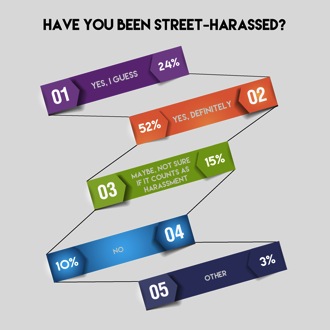 |
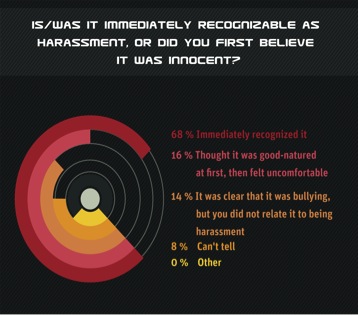 |
Public transport and streets seem to be the hubs of street harassment. “First, it will start with catcalls, if it is a deserted area it will move to degrading comments”.
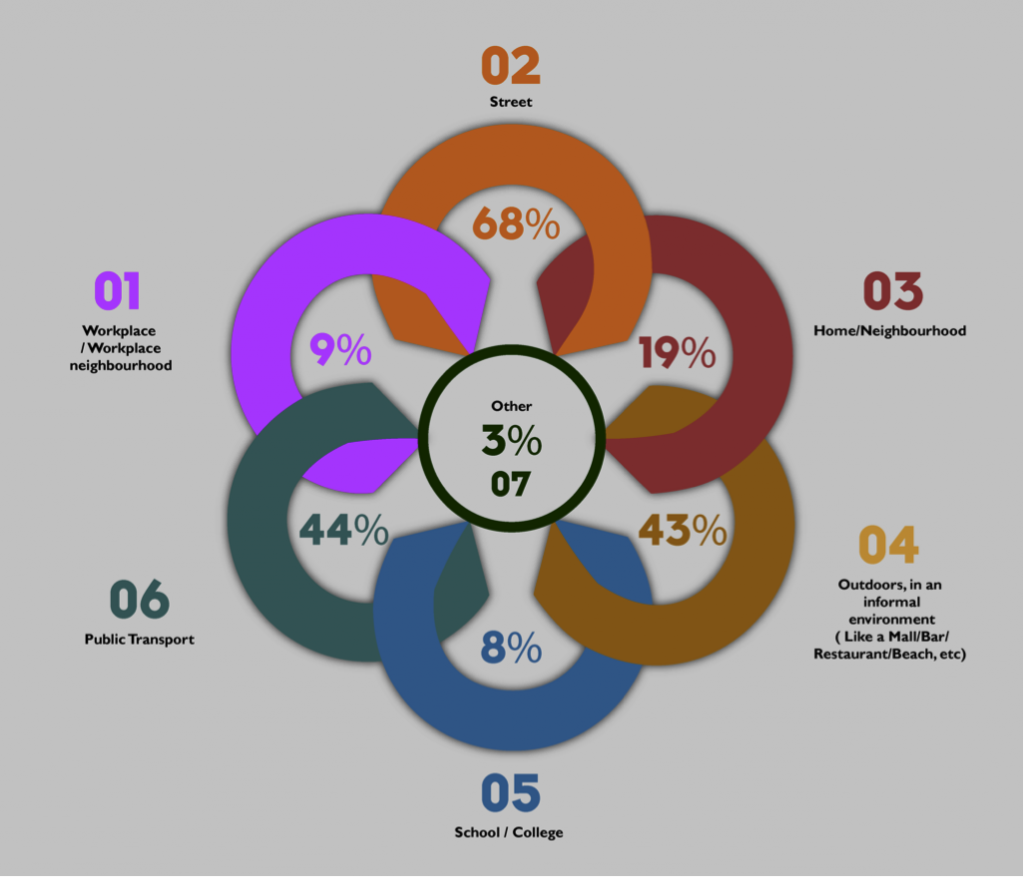 |
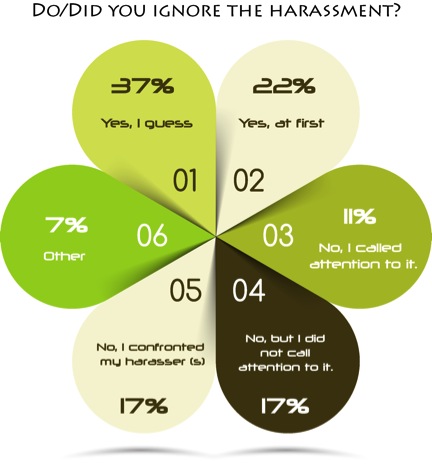 |
“I cycle to work, so most days I experience cat calls, honking at me to get my attention- so that they can make kissing gestures and other hand gestures that make me cringe, they sometimes even shout out words and make me feel uncomfortable. Aside from the men on the road who make such remarks I also face road safety issues thanks to many women and men who brush me off the road because I ride a cycle. Other men on cycles also make kissing gestures and other signals that make me feel uncomfortable. But all this I have only ignored. I have looked at them angrily, but somehow, showing them that you are angry makes them more excited and they accelerate towards you.”
“Most of the time, harassment happens when you are least expecting it; while walking down a busy road, at the railway station and sometimes in a crowded street, which you’re having a hard time navigating. It also largely occurs in public transport, where it can easily be brushed aside as lack of space. The point is, with me, it has mostly happened when I’ve been in a crowd, as against the empty or badly lit street back home.”
Verbal harassment isn’t the end of it. Physical harassment is more common than verbal, because in a city as crowded as Chennai, it is almost unnoticeable. “I am pinched/felt up/groped almost everyday on the public bus at rush hour”. Our survey reports incidents of physical harassment from strangers, while walking, driving, or taking any form of public transport, including cabs.
“It ranges from making lewd comments, singing and whistling to groping, rubbing up against me. I believe that even bothering me when I don’t want to talk — forcing me to make conversation or give them attention — and expressing an interest in me when I’ve made it abundantly clear that I’m not interested, is harassment. Fortunately, I’ve never been asked by strangers to smile.”
For Chennai, that’s fortunate indeed.
Is it that hard to have a constructive discussion about street harassment in Chennai? We asked our survey participants how they felt about speaking to people about their experience of being street harassed. “I am not told ‘Boys will be Boys’, I am told ‘Girls should be Girls!’ I am always made to believe I did something to bring this ‘attention’ to myself”. Many conversations about street harassment transform into situations where the confidante shares a similar story from their life, or brushes it off, saying “This is how things are in India” or “You should adjust”, or just more advice about dressing conservatively, and only going out in groups. There is not a dearth of support, just a deep sense of helplessness at the status-quo. “I am always told, ‘We must learn to survive. This is how life is’. It sure as hell needn’t be!”
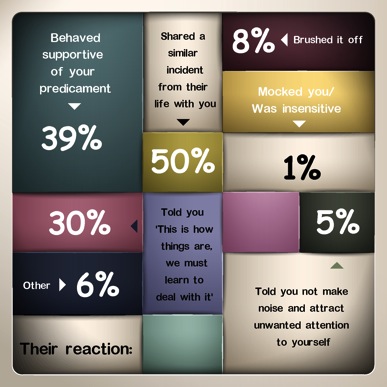 Our mission is to move people of all genders to start acknowledging street harassment as a problem, and not a convention in Chennai. We want to get women to start talking about experiencing street harassment in Chennai. We want to educate teenagers to recognize, question, and intervene in street harassment.
Our mission is to move people of all genders to start acknowledging street harassment as a problem, and not a convention in Chennai. We want to get women to start talking about experiencing street harassment in Chennai. We want to educate teenagers to recognize, question, and intervene in street harassment.
As the next step towards these goals, we are now inviting participants of our survey along with other high school and college students to participate in group-discussions about street harassment. We will use our survey and the results from it as leading points, and the results of these discussions as content for our lesson plans and aids to discuss street harassment in the classroom.
Street harassment is currently being discussed in the classrooms of our participating high-schools: recognizing it, not trivializing it, reacting to it, talking about it, and most importantly, being an effective bystander. Our dream is to expand these discussions to every school, and every classroom in Chennai, and providing tools to aid these sessions.
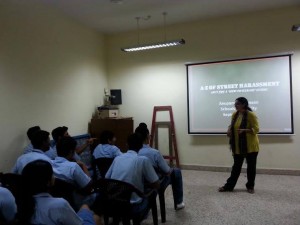 |
 |
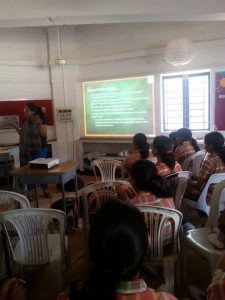 |
In the above photos, Anupama from Prajnya gives the students a ‘laundry list’ of what constitutes harassment: It is not about what the perpetrator intends, but how the person at the receiving end feels.
Most of all, we want these discussions to find ways to stop street harassment, a phenomenon that stems from inequality among genders: in power, safety, entitlement, and respect. Quoting a response from our survey, “I carry pepper spray, but it is shoddily packaged and I cannot use it in case of an emergency. I think for street harassment to really stop, such men have to develop respect towards themselves, only then can they respect others around them.”
*- Storm is not her real name (quite sadly for me)
** -A kurta is an Indian tunic
***- ‘Porukki’ is a word transliterated from Tamil, the native language spoken in Chennai. It loosely translates to ‘goon’, usually used in the context of someone lewd/lecherous. And yes, I’m ashamed that we have a word for that.
Gayatri Sekar, Schools of Equality. Graphics by Samrudh Solutions
